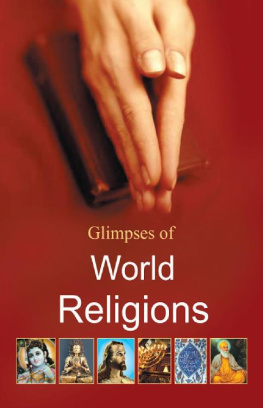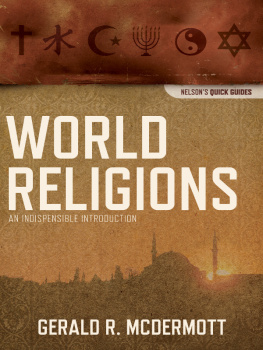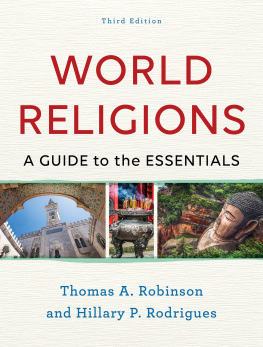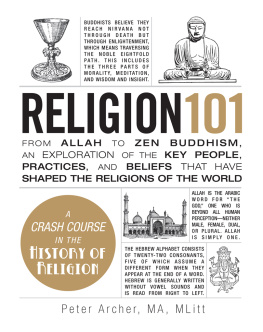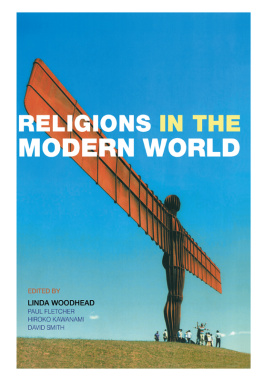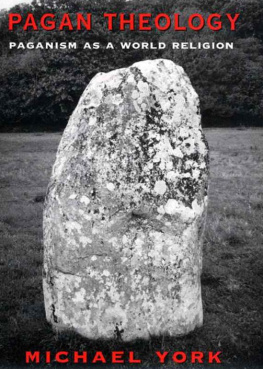Glimpses Of
WORLD RELIGIONS
JAICO PUBLISHING HOUSE
Ahmedabad Bangalore Bhopal Bhubaneswar Chennai
Delhi Hyderabad Kolkata Lucknow Mumbai
Published by Jaico Publishing House
A-2 Jash Chambers, 7-A Sir Phirozshah Mehta Road
Fort, Mumbai - 400 001
jaicopub@jaicobooks.com
www.jaicobooks.com
Jaico Publishing House
GLIMPSES OF WORLD RELIGIONS
ISBN 81-7224-156-9
First Jaico Impression: 1958
Seventeenth Jaico Impression: 2011
No part of this book may be reproduced or utilized in
any form or by any means, electronic or
mechanical including photocopying, recording or by
any information storage and retrieval system,
without permission in writing from the publishers.
Printed by
Sanman & Co.
113, Shivshakti Ind. Estate, Marol Naka
Andheri (E), Mumbai - 400 059.
PREFACE
I N presenting this book in the present form to the readers, I lay myself open to some criticism. What impelled me to gather these glimpses of the religions of the world, when there are in existence innumerable renderings of each of them in a more scholarly and in a fuller form? To this criticism my reply is that scholastic and fuller renderings of the subject may be of the greatest possible value to the man of letters, to philosophers and metaphysicians, but to a general reader they are uninspiring and uninviting, for it is usual for them to stress controversial and other issues which destroy the intrinsic interest of the subject.
My endeavour has been modestly to steer clear of such controversial and other issues and to give the readers the essence of the religions. To me feeling and reverence for each of the subjects dealt with are of more meaning and of greater consequence than anything else. It will be admitted that the field of this work is much too wide to be covered with first hand knowledge by any one scholar. These glimpses may only be considered as an initiation in the subject; for more detailed knowledge of any particular religion, recourse may be had to works with a larger perspective written by scholars possessing special knowledge of the subject. In the presentation of the several religions an attempt has been made to give a sketch of religious conceptions as they appear from history, ethicstheology and religious philosophy. The limitation of space has restricted me from giving a large number of illustrative extracts and citations from the sources. I have endeavoured to bring out the individuality of each of the religions. The reader who surveys this field of religion can hardly fail to discern unity in apparent diversity, and a general trend of evolution.
In conclusion.I wish to acknowledge my deep gratitude to the various scholars, philosophers and teachers whose great works led me to the study of the religions, and who have been the source of my knowledge; for I humbly acknowledge myself to be a student and shall remain content with that appellation.
Author.
Bombay
I N T R O D U C T I O N
T HE dominant factor in the pursuit of knowledge in every department of science is to seek to exhibit the unity of law amid the multiplicity of diverse phenomena with which it has to deal; to gather up the manifold into one or to show how the one has given rise to many. This factor will prominently appear in the study of religion as in science. We must believe that the diverse religious beliefs and practices of mankind are not a mere medley, not a mere outburst of indiscretion and want of reason, but that they form a cosmos and may be known as a part of human life from which prudence and reason have never been absent and in which a growing purpose has fulfilled and still fulfils itself. In setting out on the inquiry into the unity of religion we shall have to start with certain assumptions.
The first principal assumption is that religion is a growth which is perennial and that its evolution has gone on obeying the primary laws of human progress. To inquire into anything means to know how it has come to be what it is and for this purpose one has to trace its history upto the root, and in order to trace its process of evolution it is necessary to define it. There are some scholars who maintain that religion is an intellectual activity. They say that there is only one way in which men can come to believe in higher things and that is by an intellectual process. This idea divorces from religion the practical side of religion which consists chiefly in worship. Belief and worship are inseparable sides of religion. Some others say that the basis of all religion is in the inscrutableness of the power which the universe manifests to us. This definition traces religion to the inadequacy in mans knowledge. It shows a negative rather than a positive element in mans experience. There is an absence of the practical ideas of worship and belief in this definition. Some other scholars have explained religion as the action of the curiosity or an impulse of the human mind, which prompts man to investigate the causes of things, particularly the first cause of all things. This does not tell us what religion is. This curiosity or the impulse to know is not religion. It belongs to the domain of philosophy. Religion is something more than curiosity. No definition of religion can be regarded as complete in which the motive of worship is left undetermined.
Religion is still in the process of growing and until the growth is complete an adequate definition of religion cannot be found. We shall, therefore, have to satisfy ourselves with an elementary definition of religion which is Religion is a worship of higher powers from a sense of need. Though this appears to be a very modest definition yet if we would consider its implications we would find that it is not so. In the first place it implies an element of belief in the existence of higher powers with which there could be no worship. This is the intellectual factor of religion. If there is no belief in the existence of higher powers there can be no true worship. Primarily a belief must exist that the Being worshipped is capable of supplying the needs. In the second place there must be a conviction that these powers which are worshipped are higher. It is the sense of incapacity of an individual to supply his own needs which evokes in him a belief in the existence of higher powers and he, therefore, keeps up intercourse with these powers by offering worship to them. In the third place, these higher powers are worshipped with the object of cultivating a relation with them. In every act of worship there is an impulse that the Being addressed is supreme and mightier than the worshipper. Belief in higher powers, and the worship offered to them do not, alone, constitute religion; faith arising from the sense of need must also be there. These three togetherfeeling, belief and willconstitute religion both in the lowest and in the highest form of civilisation. Even a savage living in entire isolation and buffeted by chance from misery to happiness will not seek benefits from his god without some sense of attachment. It is the first gleam of religion, when this sense of attachment has arisen. At its lowest level religion was considered to be an individual affair between the savage and his god, who supplied his material needs and comforts; at a little higher stage it becomes an affair of the tribe or family and at this stage the material needs grow broader and less personal. At both these stages the conditions of his life do not allow his higher faculties to grow and his religion, as a whole, is a mass of puerile fancies and of fixed traditions. His gods are fancied as petty and capricious.

